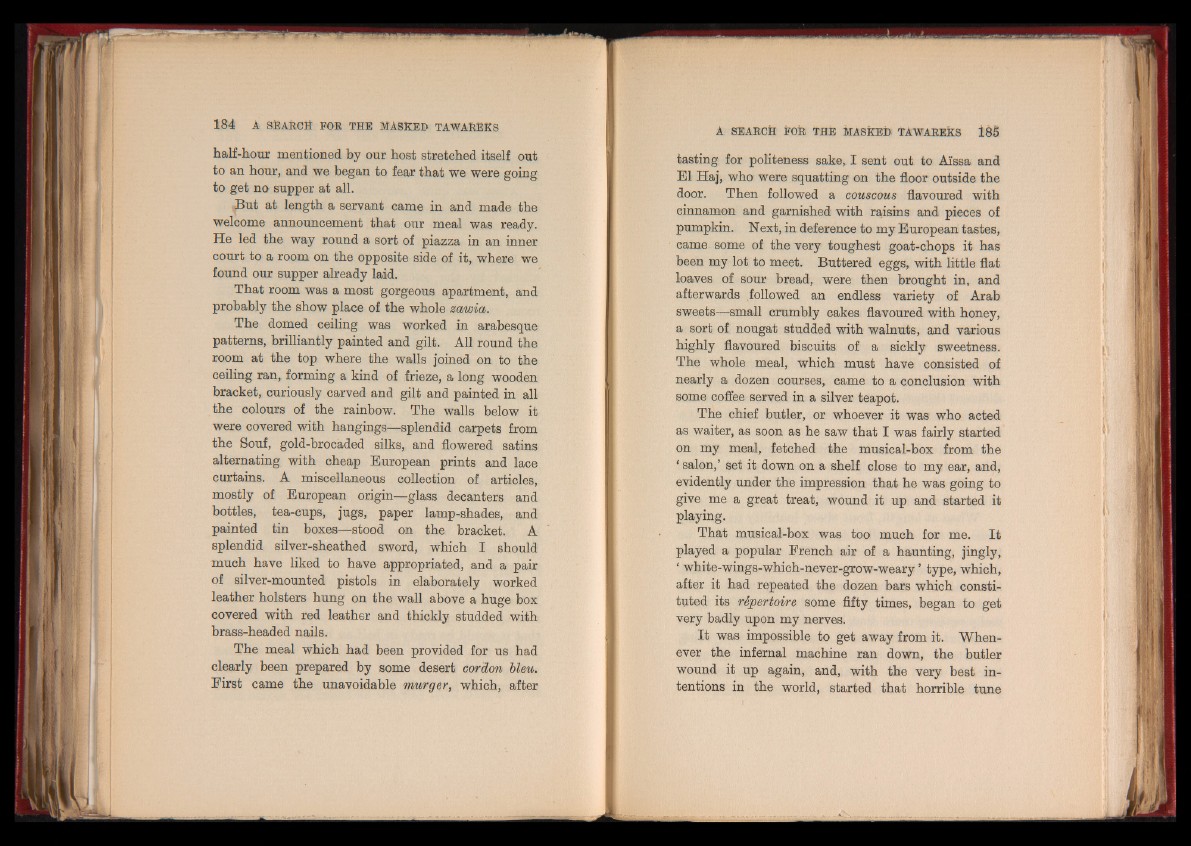
half-hour mentioned by our host stretched itself out
to an hour, and we began to fear that we were going
to get no supper at all.
But at length a servant came in and made the
welcome announcement that our meal was ready.
He led the way round a sort of piazza in an inner
court to a room on the opposite side of it, where we
found our supper already laid.
That room was a most gorgeous apartment, and
probably the show place of the whole zawia.
The domed ceiling was worked in arabesque
patterns, brilliantly painted and gilt. All round the
room at the top where the walls joined on to the
ceiling ran, forming a kind of frieze, a long wooden
bracket, curiously carved and gilt and painted in all
the colours of the rainbow. The walls below it
were covered with hangings—splendid carpets from
the Souf, gold-brocaded silks, and flowered satins
alternating with cheap European prints and lace
curtains. A miscellaneous collection of articles,
mostly of European origin—glass decanters and
bottles, tea-cups, jugs, paper lamp-shades, and
painted tin boxes—stood on the bracket. A
splendid silver-sheathed sword, which I should
much have liked to have appropriated, and a pair
of silver-mounted pistols in elaborately worked
leather holsters hung on the wall above a huge box
covered with red leather and thickly studded with
brass-headed nails.
The meal which had been provided for us had
clearly been prepared by some desert cordon bleu.
First came the unavoidable murger, which, after
tasting for politeness sake, I sent out to Aissa and
El Haj, who were squatting on the floor outside the
door. Then followed a couscous flavoured with
cinnamon and garnished with raisins and pieces of
pumpkin. Next, in deference to my European tastes,
came some of the very toughest goat-chops it has
been my lot to meet. Buttered eggs, with little flat
loaves of sour bread, were then brought in, and
afterwards followed an endless variety of Arab
sweets—small crumbly cakes flavoured with honey,
a sort of nougat studded with walnuts, and various
highly flavoured biscuits of a sickly sweetness.
The whole meal, which must have consisted of
nearly a dozen courses, came to a conclusion with
some coffee served in a silver teapot.
The chief butler, or whoever it was who acted
as waiter, as soon as he saw that I was fairly started
on my meal, fetched the musical-box from the
‘ salon,’ set it down on a shelf close to my ear, and,
evidently under the impression that he was going to
give me a great treat, wound it up and started it
playing.
That musical-box was too much for me. It
played a popular French air of a haunting, jingly,
* white-wings-which-never-grow-weary ’ type, which,
after it had repeated the dozen bars which constituted
its repertoire some fifty times, began to get
very badly upon my nerves.
It was impossible to get away from it. Whenever
the infernal machine ran down, the butler
wound it up again, and, with the very best intentions
in the world, started that horrible tune